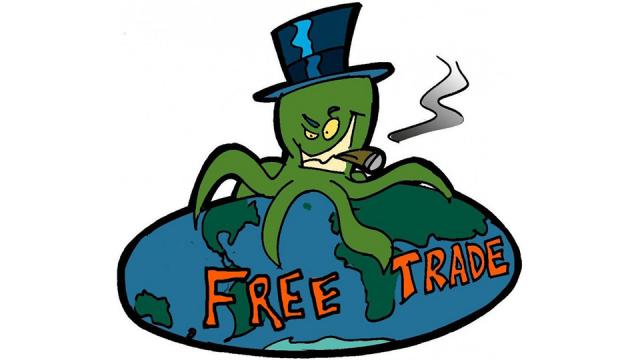
A secretive group met behind closed doors in New York last week. What they decided may lead to higher drug prices for you and hundreds of millions around the world.
Representatives from the United States and 11 other Pacific Rim countries convened to decide the future of their trade relations in the so-called Trans-Pacific Partnership (T.P.P.). Powerful companies appear to have been given influence over the proceedings, even as full access is withheld from many government officials from the partnership countries.
Among the topics negotiators have considered are some of the most contentious T.P.P. provisions — those relating to intellectual property rights. And we’re not talking just about music downloads and pirated DVDs. These rules could help big pharmaceutical companies maintain or increase their monopoly profits on brand-name drugs.
The secrecy of the T.P.P. negotiations makes them maddeningly opaque and hard to discuss. But we can get a pretty good idea of what’s happening, based on documents obtained by WikiLeaks from past meetings (they began in 2010), what we know of American influence in other trade agreements, and what others and myself have gleaned from talking to negotiators.
Trade agreements are negotiated by the office of the United States Trade Representative, supposedly on behalf of the American people. Historically, though, the trade representative’s office has aligned itself with corporate interests. If big pharmaceutical companies hold sway — as the leaked documents indicate they do — the T.P.P. could block cheaper generic drugs from the market. Big Pharma’s profits would rise, at the expense of the health of patients and the budgets of consumers and governments.
There are two ways the office of the trade representative can use the T.P.P. to maintain or raise drug prices and profits.
The first is to restrict competition from generics. It’s axiomatic that more competition means lower prices. When companies have to fight for customers, they end up cutting their prices. When a patent expires, any company can enter the market with a generic version of a drug.
The differences in prices between brand-name and generic drugs are mind- and budget-blowing. Just the availability of generics drives prices down: In generics-friendly India, for example, Gilead Sciences, which makes an effective hepatitis-C drug, recently announced that it would sell the drug for a little more than 1 percent of the $84,000 it charges here.
That’s why, since the United States opened up its domestic market to generics in 1984, they have grown from 19 percent of prescriptions to 86 percent, by some accounts saving the United States government, consumers and employers more than $100 billion a year. Drug companies stand to gain handsomely if the T.P.P. limits the sale of generics.
The second strategy is to undermine government regulation of drug prices. More competition is not the only way to keep down the prices of essential goods and services. Governments can also directly restrain prices through law, or effectively restrain them by denying reimbursement to patients for “overpriced” drugs — thus encouraging companies to bring down their prices to approved levels.
These regulatory approaches are especially important in markets where competition is limited, as it is in the drug market. If the United States Trade Representative gets its way, the T.P.P. will limit the ability of partner countries to restrict prices. And the pharmaceutical companies surely hope the “standard” they help set in this agreement will become global — for example, by becoming the starting point for United States negotiations with the European Union over the same issues. Continue reading the main story Continue reading the main story
Americans might shrug at the prospect of soaring drug prices around the world. After all, the United States already allows drug companies to charge what they want. But that doesn’t mean we might not want to change things someday. Here again, the T.P.P. has us cornered: Trade agreements, and in particular individual provisions within them, are typically far more difficult to alter or repeal than domestic laws.
We can’t be sure which of these features have made it through this week’s negotiations. What’s clear is that the overall thrust of the intellectual property section of the T.P.P. is for less competition and higher drug prices. The effects will go beyond the 12 T.P.P. countries. Barriers to generics in the Pacific will put pressure on producers of such drugs in other countries, like India, as well.
Of course, pharmaceutical companies claim they need to charge high prices to fund their research and development. This just isn’t so. For one thing, drug companies spend more on marketing and advertising than on new ideas. Overly restrictive intellectual property rights actually slow new discoveries, by making it more difficult for scientists to build on the research of others and by choking off the exchange of ideas that is critical to innovation. As it is, most of the important innovations come out of our universities and research centers, like the National Institutes of Health, funded by government and foundations.
The efforts to raise drug prices in the T.P.P. take us in the wrong direction. The whole world may come to pay a price in the form of worse health and unnecessary deaths.
Joseph E. Stiglitz, a Nobel laureate in economics, a professor at Columbia and a former chairman of the Council of Economic Advisers, is the author of “The Price of Inequality.”
3 WAYS TO SHOW YOUR SUPPORT
- Log in to post comments















